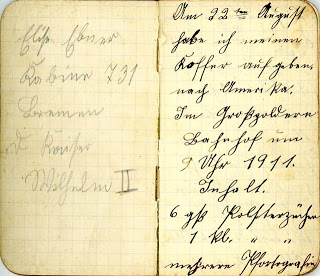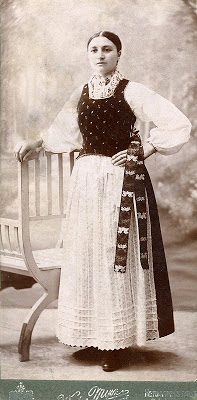Bags packed. Ready to go. Hugs, and tears and kisses all around. “I’ll write as soon as I can,” Lisi says to her father, sisters and brother.
“Safe journey,” they say. “Come back to us.” “We’ll miss you so.”
I can imagine the scene when my grandmother, Elisabetha (Lisi) Ebner departed to meet her love, my grandfather, Josef, in Chicago–a century ago this summer, but I didn’t know the exact date she actually left her hometown of Grosspold, Austro-Hungary (now Romania) for America. I had the date and time of her arrival in New York as well as the ship on which she arrived — she wrote those details on the back of a postcard, which I’ll share in a future post.
But then I found the tiny book, just 2.5” wide, 4” tall, with its stark, unlabeled, black leather cover.
When I had first perused the pages, (when? Ages ago!) lined like graph paper, it seemed a record primarily of addresses and unrelated numbers. With scores of letters waiting to be deciphered, I decided decoding the little book wasn’t a priority.

Lisi Ebner’s diary. The right side is where I believe she started the notes of her trip, 8/22/1911, and added details about her ship on the left, probably after arriving in Bremen.
But recently I looked at it again — and with an eye more trained in the old writing, I knew I had another example of my grandmother’s amazing compulsion to record her life.
On the first facing page, (which is where I believe she started her notes), I made out the following:
| Am 22 August: | On August 22nd |
| Koffer: | suitcase |
| Bahnhof: | train station |
| 9 Uhr 1911: | 9:00 [a.m.] 1911 in BIG LETTERS |
| Amerika: | The major clue that I was onto something. |
It was Lisi’s diary of her train trip from Grosspold to Bremen. I scanned it immediately and sent it off for “decoding” to my ninety-year-old German Rosetta Stone in Germany. I’ve translated as best I could a rather confusing conglomeration of train schedules, addresses, expenses, and, possibly, an early version of networking.
But the first few pages are clear. Here’s what she wrote:
On the 22nd of August, 1911, I brought my suitcase to the Grosspold Train station at 9:00.
Contents:
6 large pillow cases
1 small pillow case
Many photographs
7 matching hand towels,
3 matching hand towels, one red, one white one blue
3 table towels
Two white napkins
6 blue napkins
1 cabinet towel (perhaps like a doily for a dresser?)
1 linen towel – just beginning work on it (perhaps a decorative cover for a dresser or cabinet. Perhaps she had begun to crochet the edges, or embroider a design onto a corner something she did all her life
A city map of Vienna
A map of Austria
A joke book (Could it be the book of jokes and songs that my grandfather, Josef, had created in the summer of 1910 (See the post, Drafted 100 Years Ago).
A Grosspold Costume without the shirt (probably just the skirt and apron. Here she is in her “Grosspold Costume,” at left.
My guess is that this is only one of several suitcases or trunks she took along, for it’s only homemaking or practical items.
But it’s the first step in a 5,000 mile journey to meet my grandfather, Josef Gärtz. On the way, she will keep track of every stop the train makes, how much she spends on food, small gifts, and souvenirs.
She writes little of what she sees, and nothing of emotions or impressions. Perhaps it was too hard, at that time, to express herself in writing, having had so little opportunity to practice. I doubt she had written much beyond lists, basic instructions, and the letters to Josef since she had left school after the fourth grade. Her life had been filled with “productive” work. Time to just “write” for pleasure or art was non-existent–and probably never even occurred to her. Yet she was compelled to write, and here began her penchant for recording details and eventually evolving into a prolific correspondent that kept her in touch with loved ones for nearly seven decades.
In future posts we’’ll follow Lisi on her journey, and find out how Mrs. Jickeli, her former employer, even after her departure, took care of important business for Lisi.

What a find! I love that she documented everything she was taking with her.
I have goosebumps just reading that. As a person who’s spent her whole live moving, I’ve often wondered what my ancestors took with them when they left Europe. To have a LIST…wow.
What a fascinating story! I noticed in reading my great-grandmother’s diaries that she too, said little about her feelings or emotions, it was all very practical.
What mixed emotions she must have had to leave her family so far behind. Great story – looking forward to more!
Thanks to all for your comments. My grandfather also made a list of what he brought. If you enjoy seeing the kinds of items immigrants thought might be important a century ago, you may also enjoy (click on the title) The Pocketwatch and the Packing List
Oooh! This sounds like a really special find. I’ll stay tuned for more on the journey.
I am amazed by the amount of detail and information that goes into all of her diaries! You and your family are very lucky to have this treasure and I am glad you are sharing it with the rest of us!